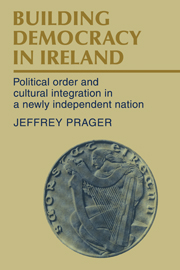 Building Democracy in Ireland
Building Democracy in Ireland Book contents
- Frontmatter
- Contents
- Preface
- Part 1 Democracy in Ireland: Theoretical and Empirical Problems
- Part 2 Patterns of Crisis Resolution in the Irish Free State, 1922–1932
- Part 3 The Character of Irish Democracy
- 7 The Democratic Achievement in Ireland: The Reconciliation of Culture and Politics
- 8 The Uniqueness of Irish Democracy
- Notes
- References
- Index
8 - The Uniqueness of Irish Democracy
Published online by Cambridge University Press: 25 October 2011
- Frontmatter
- Contents
- Preface
- Part 1 Democracy in Ireland: Theoretical and Empirical Problems
- Part 2 Patterns of Crisis Resolution in the Irish Free State, 1922–1932
- Part 3 The Character of Irish Democracy
- 7 The Democratic Achievement in Ireland: The Reconciliation of Culture and Politics
- 8 The Uniqueness of Irish Democracy
- Notes
- References
- Index
Summary
Ireland's democratic achievement, as I have argued, was a result both of Cumann na nGaedheal's unflagging commitment to parliamentary structures, despite the political costs to the party, and of Fianna Fáil's strengthening of the public by including culturally disaffected members. The need for both strong institutions, buffered from the population, and cultural integration involved the creation of a uniquely Irish pattern of democracy. It was a pattern deeply beholden to parliamentary forms while simultaneously responsive to the understandings of politics that emerged through the Irish public. Fianna Fáil's success in broadening the social composition of the public required new patterns of relatedness between the political elite, the institutions of rule, and the public.
In every society where the social composition of the public has expanded, the character of democratic politics has been profoundly altered. When, for example, the working classes in England, France, and Germany gained political rights, party systems were transformed, political accountability was expanded, and the criteria for political decision making became more articulate and universalistic. Politics was no longer the preserve of an elite few, nor was the state in service solely to a relatively small, privileged group.
The expansion of the public in Ireland produced similarly dramatic shifts in the nature of politics and the extent of elite accountability. But because this occurred in the twentieth century rather than the nineteenth, and after the population had been substantially mobilized and politicized in the nationalist struggle, the meaning and consequence of a broader public were very different.
- Type
- Chapter
- Information
- Building Democracy in IrelandPolitical Order and Cultural Integration in a Newly Independent Nation, pp. 215 - 225Publisher: Cambridge University PressPrint publication year: 1986


